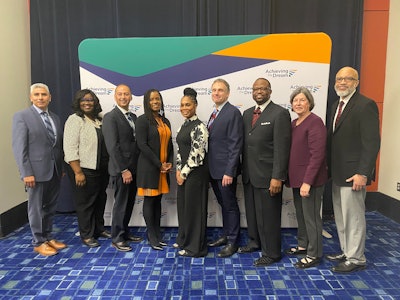Energy and excitement filled the McCormick Place Convention Center in Chicago, as over two thousand community college leaders, faculty, and staff gathered to share stories of access, equity, and inclusion at the 2023 Dream conference. The four-day event connects educators, both in and outside Achieving the Dream’s (ATD) network of over 300 community colleges, working to close attainment gaps.
 Presidents of the five City Colleges of Chicago accepted in the inaugural Accelerating Equitable Outcomes program stand with other Achieving the Dream network presidents and ATD President Dr. Karen A. Stout.
Presidents of the five City Colleges of Chicago accepted in the inaugural Accelerating Equitable Outcomes program stand with other Achieving the Dream network presidents and ATD President Dr. Karen A. Stout.
Stout characterized the work to close equity gaps in higher education as Sisyphean, constantly pushing the rock uphill, a brutal battle against gravity that always seeks the summit. Achieving the summit doesn’t just support the student on their way to a degree but also the community they live in.
“Community prosperity rests on [community colleges’] shoulders, as we are perhaps more than any other institutions hubs of equitable social and economic mobility,” said Stout. “Our colleges have to be inextricably connected to our communities, leveraging our localness. The best community colleges take the shape of their community while building a new future for that community through support of students.”
The theme of this year’s conference, in-person for the first time since COVID-19, is access, momentum, mobility and community impact. The challenge of the work, Stout added, will be to shift institutional design to be created through the lens of students and community.
“As a sector, we must take responsibility for remedying our design flaws rather than placing the burden on students who are marginalized,” said Stout. “We need to love and care about the students we serve and design our colleges so all students feel a sense of worth and belonging.”
ATD also announced the 10 community colleges selected as the first cohort for ATD’s new three-year Accelerating Equitable Outcomes program. Funded by a grant from philanthropist MacKenzie Scott, the cohort will receive capacity building support from ATD with the goal of increasing the number of students achieving a postsecondary credential, which will in turn bolster the communities in which they live.

“The fact that all the eligible institutions at CCC were accepted speaks volumes to the groundwork you’ve already been engaged with over the last several years to address key challenges in student access and completion,” said Stout at the announcement on Wednesday. “We celebrate you, your commitment, your work, and formally say welcome to the ATD network.”
The five other community colleges hail from California, New Mexico, and New York. They will support each other as well as receive guidance and coaching from ATD leadership and other ATD member colleges.
“[ATD] staff and coaches will learn as much as we can about what you’re already doing around student success. Our real goal will be to help you crack coherence—what is the lever, the high impact practices you can put in place, and how can we as an organization support you moving forward,” said Stout. “This will be real partnership, a different approach for ATD, frankly, because we need to understand your context.”
Juan Salgado, CCC Chancellor, said his community colleges are “already increasingly the most accessible higher education engines of socio-economic mobility and racial equality.” But despite their efforts to increase access and opportunity for all, equity gaps remain.
“We must and will eliminate [those gaps] to achieve the vision we have for our city, and ATD is going to help us incredibly in this effort,” said Salgado.
This inaugural cohort will have the opportunity to learn from institutions like Odessa College in west Texas, whose membership with ATD has helped them achieve a 96 – 97% completion rate for all courses, and William Rainey Harper College in Palatine, Illinois.
When Harper College joined ATD in 2009, their graduation rate was a mere 14%. Today, their graduation rate has jumped to 38%, an achievement Harper College President Dr. Avis Proctor acknowledged was significant, but “still not good enough.”
Proctor said that ATD’s academic assessment tools helped her institution and others as they embarked on a “whole college transformation.”
“ATD understands the moral imperative, the mission to be there to help those who need us the most, to ensure access and success is our focus,” said Proctor. “Our focus is on post-completion, equitable outcomes, which is key for all our students to enter into a career with a life-sustaining wage, enriching our community—that’s our ultimate goal.”
Liann Herder can be reached at [email protected].



















